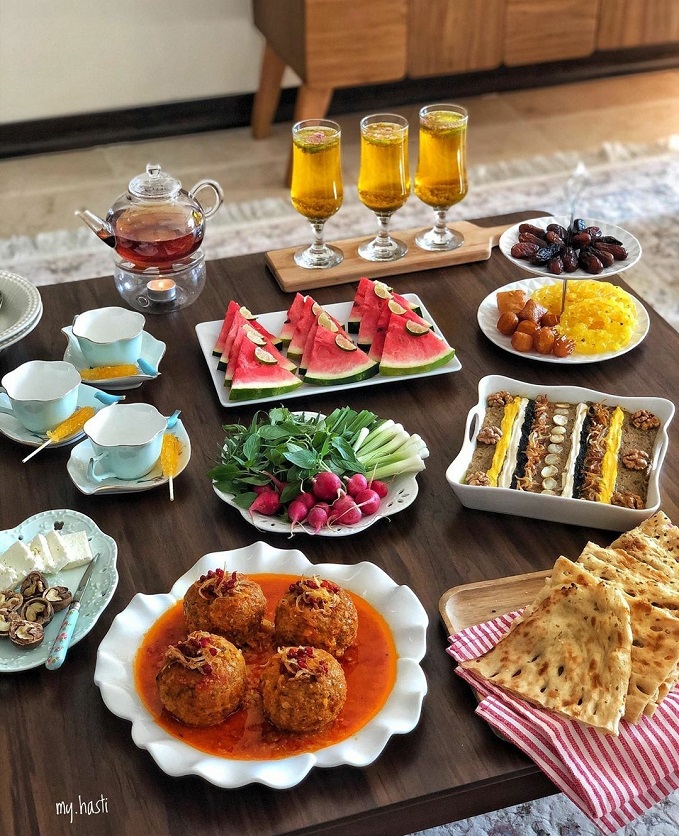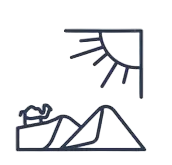Invited to God’s fiesta? Ramadhan is known to be the month of God’s feast, while the guests are believers who fast. Fasting, literally meaning to prevent eating in a period of the day, is a part of almost all religions! Based on Islam, Muslims should fast during the month of Ramazan/Ramadhan, the 9th month of the Islamic calendar.
People in Iran believe that fasting is not all about starving oneself, it’s even more about being gentle, unselfish, and putting a stop to evil deeds! So in Ramadhan, giving away food, money as well as giving a party is pretty common.
How to break a fast like an Iranian? What to eat first at Iftar time?
When the sun sets and the first star shows up in sky, it’s the perfect time to break the fast!
Just like breakfast, the first thing you eat after hours of having nothing is very important for your health! In Iran, a warm beverage like hot rosewater, chicory sweat, and eglantine sweat is one of the best options which is accompanied by dates, Ranginak or Zulbia Bamiyeh! You know what dates are, but how about Ranginak and Zulbia Bamiyeh?
Ranginak is a mixture of date with some walnuts, pistachio, or both served with a special sauce of flour, coconut powder, cinnamon, and cardamom! So delicious and sweet! Iranian eat Ranginak with tea and as a side dish!
Zulbia Bamiyeh are actually two different sweets that normally come together! They are made mainly by farina, baking soda, eggs, rose water and saffron! It’s good to mention that it contains a lot of sugar!
After breaking fast with the warm beverage and the sweet, people say “may god accept (our good deeds) “, as congratulating each other for another day of fasting for Allah sake.
What is next?
Since the Iftar time is right the same time to practice the 4th and 5th Salah of the day, it’s optional to pray first or eat dinner!
At home, some people, prefer to eat dinner first then practice Namaz (Salah)! While at mosques and by people who are more religious, they perform Salah first, and then they have dinner!
Putting the table! One by one the dinner table is filled with advance prepared cuisine, different side dishes, desert, and even fruits!
The best food inspiration ever!

What are the main Iranian dishes for Iftar in Ramazan holy month?
Foods of Ramadan used to be very simple like different kinds of Ash! Ash is a wealthy kind of soup with different kinds of beans! However, in traditional Persian sofrah fresh bread, vegetables, yogurt, pickles, halwa, and even fruits give a variety of choices to food lovers!
Ramadan Rituals and Special Tradition
One of the most famous rituals of Ramadan is “Laylatol Qadr”, meaning the night of value!
What is Night of Value?
It’s said in Quran that the Quran verses were revealed to Mohammad the prophet at the night of value! So at this night Muslims stay awake at night, recite Quran and pray.
The night of value is known to be an odd night of the last 10 days of the month of Ramadan! Muslims of Shitte relation and Sunni relation stay awake and pray in different dates!
Shitte relations believe on 23rd night of Ramadan, but also praying on the 19th and 21st of Ramadan.
And Sunni people believe on 27th night of Ramadan, but usually praying all last 10 nights of Ramadan.
Laylatol Ghadr (The night of value) is so important in Iran that some government organizations, companies, and even schools start a few hours later than usual in the morning so that people can get enough rest after the whole night praying.
At Laylatol Qadr, people gather at shrines, mosques, universities, parks, personal houses, and etc, to pray together.













